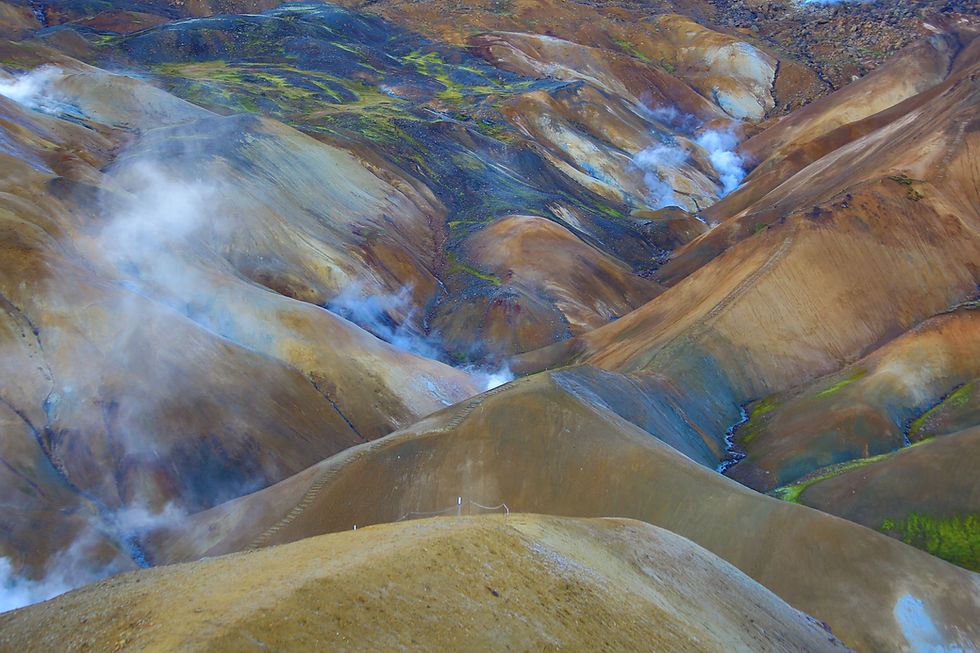Mauna Loa Erupts Again
- Dec 7, 2022
- 4 min read
Updated: Jan 1, 2025
November 27, 2022

At around 11:30 pm on the 27th of November, the largest shield volcano on Earth erupted with a huge plume of smoke over the caldera and 3 fissures opening up on it's northeast rift zone. Some people felt a quake just before the molten lava started exuding from the top of it's caldera. During the early hours before light, some had captured the fiery glow of Mauna Loa from all sides of the island. By 1:30 pm the following day, both fissures 1 and 2 had stopped flowing while fissure 3 continued to billow plumes of sulfur dioxide with water vapor. Lava was seen fountaining up to as high as 150 feet above the fissure.
That morning we managed to charter a flight with Paradise Helicopters to view the eruption that afternoon. We were excited to be one of the first few to do this, but unfortunately, the flight was short lived due to bad weather. We made it over Hualalai from the Kona airport, but once in the saddle between Hualalai and Mauna Loa, we were greeted by a wall of swirling clouds that shrouded both Mauna Loa and Mauna Kea. It was just not to be...
Later in the evening we decided to take a drive out to Daniel K. Inouye (DKI) Highway to see the flows and glows firsthand. We were not the only ones with this idea as the highway was packed with many people gawking at the mountain. Upon arrival on DKI, the traffic was heavier than usual and there were many folks pulling along side the highway to stop and take in the views. The first views were of a side profile of the fissure along with a thin line of red glowing lava along the ridge. As we approached the mid section of the highway towards the junction to Mauna Loa Observatory Road, we could then see the full frontal view of the fissure with its ribbons of lava coming down the mountain towards the highway.

We decided to make our way up Mauna Kea Access Road to the visitor center. Even here there were many cars parked along the road in the dark, with folks traipsing around the many cones to get a view. Almost immediately the main attraction to this area was no longer Mauna Kea's sunset, but rather everyone was here to see Mauna Loa's eruption!

Over the next few days we waited impatiently for when our helicopter flight could be resumed. No flights are allowed at night, and the best viewing time is in the early morning hours as the sun rises. There was no availability due to the many documentary and photography buffs chartering ahead of us(!) We got bumped on the Thursday flight, but fortunately was on our way by Friday (the fifth day post eruption). Thankfully, the weather was just perfect and fissure 3 was still spewing lava. It turned out to be a great flight that we'd remember for a long time to come. Here is the link to the flight video.
The following Sunday, we decided to see if we could see the eruption from Mauna Kea's west flank off the Skyline 4WD road. We traversed by jeep to the highest point accessible by car, and then proceeded on foot to the main west plateau towards Mauna Kea's peak. This placed us at about 12,500 feet and pretty much just looking down at Mauna Loa's eruption. Alas, although we could see the plume, we were a bit too far west to see the lava flow. Additionally, there was a huge fog and cloud front below us obscuring the mountains and the saddle below 9,000 feet. Here is the video for this adventure.
Up here the air was thin, and probably full of vog that we couldn't quite see; not to mention the volcanic dust that rises off the ground when one walks here. There was quite a bit of glass fibers (colloquially known as Pele's Hair) all over the mountain. These looked like fine golden strands of hair; which is why it is locally named after the Goddess Pele who is said to live in Mauna Loa.

At this time on the 11th day of the eruption, the flow is only travelling about 20 feet per hour. It has slowed immensely since arriving at the flat area of the saddle, and it has started to build a huge embankment at the edge of the flow.

At 1.8 miles from DKI, will it cross the highway... Apparently not as the flow stops about 1.5 miles from the highway on the 12th day of the eruption.













Comments